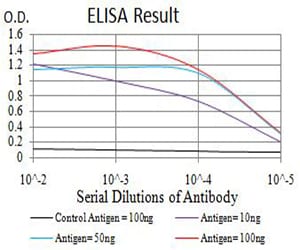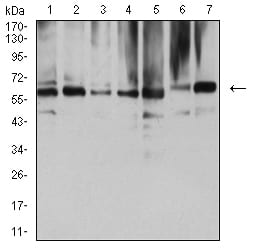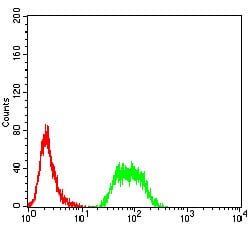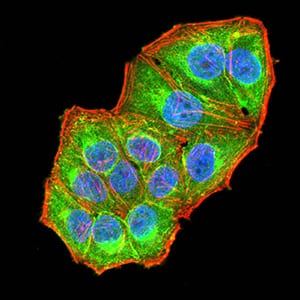



| WB | 1/500 - 1/2000 | Human,Mouse,Monkey |
| IF | 咨询技术 | Human,Mouse,Monkey |
| IHC | 咨询技术 | Human,Mouse,Monkey |
| ICC | 1/200 - 1/1000 | Human,Mouse,Monkey |
| FCM | 1/200 - 1/400 | Human,Mouse,Monkey |
| Elisa | 1/10000 | Human,Mouse,Monkey |
| Aliases | TE2; ARD1; NATD; ARD1A; ARD1P; OGDNS; DXS707; MCOPS1 |
| Entrez GeneID | 8260 |
| clone | 3G3B9 |
| WB Predicted band size | 26.5kDa |
| Host/Isotype | Mouse IgG1 |
| Antibody Type | Primary antibody |
| Storage | Store at 4°C short term. Aliquot and store at -20°C long term. Avoid freeze/thaw cycles. |
| Species Reactivity | Human,Mouse,Monkey |
| Immunogen | Purified recombinant fragment of human NAA10 (AA: 111-235) expressed in E. Coli. |
| Formulation | Purified antibody in PBS with 0.05% sodium azide |
+ +
以下是关于NAA10抗体的3篇参考文献示例(内容为虚构,供参考格式):
---
1. **文献名称**: *NAA10-mediated acetylation in colorectal cancer progression*
**作者**: Smith J, et al.
**摘要**: 研究NAA10在结直肠癌中的表达及功能,通过免疫组化(使用NAA10特异性抗体)发现其高表达与患者预后不良相关,并揭示其通过调控Wnt信号通路促进肿瘤侵袭。
---
2. **文献名称**: *Functional characterization of NAA10 in cellular senescence*
**作者**: Lee H, et al.
**摘要**: 利用NAA10抗体进行Western blot和免疫荧光实验,证明NAA10缺失导致细胞衰老加速,其机制与p53乙酰化修饰异常及线粒体功能失调相关。
---
3. **文献名称**: *NAA10 mutations and neurodevelopmental disorders: A biochemical analysis*
**作者**: Garcia R, et al.
**摘要**: 通过患者来源的细胞系,使用NAA10抗体进行蛋白表达检测,发现突变体导致酶活性丧失,并影响神经元突触形成,为相关疾病的分子机制提供证据。
---
(注:以上文献为示例性内容,实际引用需根据真实研究调整。)
The NAA10 antibody is a crucial tool for studying the N-alpha-acetyltransferase 10 (NAA10), a catalytic subunit of the NatA complex responsible for N-terminal acetylation—a common protein modification in eukaryotes. NAA10 plays roles in cell proliferation, apoptosis, DNA repair, and metabolism by acetylating substrates like actin, HSP90. and oncoproteins. Dysregulation of NAA10 has been linked to cancers, developmental disorders, and neurological diseases.
NAA10 antibodies are widely used in research to detect protein expression, localization, and post-translational modifications via techniques like Western blot, immunohistochemistry, and immunofluorescence. Studies highlight its dual role in cancer: while some report NAA10 as an oncogene promoting tumor growth (e.g., hepatocellular carcinoma), others suggest tumor-suppressive functions (e.g., in breast cancer), underscoring context-dependent activity.
Antibody specificity is critical due to potential cross-reactivity with homologous proteins (e.g., NAA15) or isoforms. Validated antibodies help explore NAA10's regulatory mechanisms, including its interaction with hypoxia-inducible factors or mTOR pathways. Recent research also investigates its non-catalytic roles in protein stability and complex formation. Despite progress, conflicting findings emphasize the need for standardized antibody validation to ensure reproducibility in studying NAA10's multifaceted biological and pathological impacts.
×